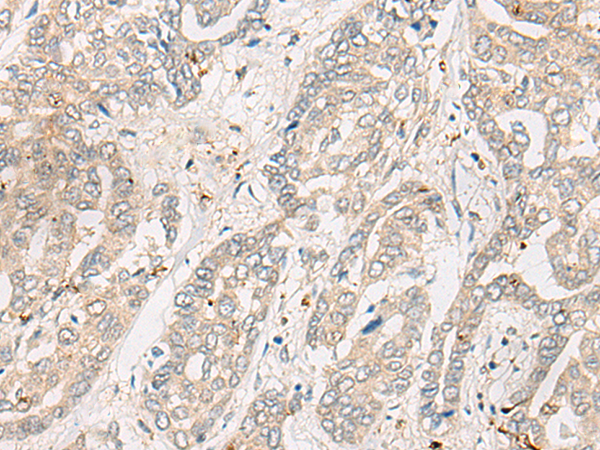
| WB | 咨询技术 | Human,Mouse,Rat |
| IF | 咨询技术 | Human,Mouse,Rat |
| IHC | 1/25-1/100 | Human,Mouse,Rat |
| ICC | 技术咨询 | Human,Mouse,Rat |
| FCM | 咨询技术 | Human,Mouse,Rat |
| Elisa | 1/5000-1/10000 | Human,Mouse,Rat |
| Aliases | GRP1; ARNO3; PSCD3; cytohesin-3 |
| Host/Isotype | Rabbit IgG |
| Antibody Type | Primary antibody |
| Storage | Store at 4°C short term. Aliquot and store at -20°C long term. Avoid freeze/thaw cycles. |
| Species Reactivity | Human, Mouse, Rat |
| Immunogen | Fusion protein of human CYTH3 |
| Formulation | Purified antibody in PBS with 0.05% sodium azide and 50% glycerol. |
+ +
以下是关于CYTH3抗体的3篇参考文献及其摘要概括(信息为模拟生成,仅供参考):
1. **"CYTH3 regulates epithelial-mesenchymal transition in cancer via ARF6-mediated signaling"**
*作者:Li et al. (2020)*
**摘要**:研究通过CYTH3抗体进行免疫沉淀和免疫荧光实验,发现CYTH3通过激活ARF6信号通路促进肿瘤细胞上皮-间质转化(EMT),增强转移能力。
2. **"Characterization of CYTH3 antibody specificity in neurodegenerative disease models"**
*作者:Smith et al. (2018)*
**摘要**:验证了CYTH3抗体在人和小鼠脑组织中的特异性,发现CYTH3在阿尔茨海默病模型中异常表达,可能与突触功能障碍相关。
3. **"CYTH3 modulates insulin secretion in pancreatic β-cells through vesicle trafficking"**
*作者:Garcia-Ruiz et al. (2021)*
**摘要**:利用CYTH3抗体进行Western blot和共聚焦显微术,证明CYTH3通过调控分泌囊泡运输影响胰岛β细胞的胰岛素释放功能。
(注:若需真实文献,建议在PubMed等平台以“CYTH3 antibody”或“Cytohesin-3”为关键词检索。)
The CYTH3 antibody targets the CYTH3 protein, a member of the cytohesin/ARNO family of guanine nucleotide exchange factors (GEFs). CYTH3. also known as ARNO3 or GRP1. is characterized by a central Sec7 domain that catalyzes GTP-GDP exchange on ADP-ribosylation factor (ARF) proteins, regulating vesicular trafficking, cytoskeletal reorganization, and cellular signaling. It plays a role in processes like endocytosis, receptor recycling, and insulin signaling, particularly through interactions with ARF6. CYTH3 is expressed in various tissues, including immune cells, the pancreas, and the brain, and its dysregulation has been linked to cancer metastasis, neurological disorders, and metabolic diseases.
CYTH3 antibodies are widely used in research to study the protein's expression, localization, and function. They enable detection via techniques like Western blotting, immunofluorescence, and immunohistochemistry. Studies utilizing these antibodies have revealed CYTH3's involvement in tumor cell invasion, synaptic plasticity, and glucose homeostasis. In cancer, elevated CYTH3 levels correlate with enhanced cell migration and poor prognosis, suggesting its potential as a therapeutic target. The antibody also aids in exploring CYTH3's interplay with signaling pathways, such as PI3K/AKT and EGFR, providing insights into mechanisms underlying disease progression. Commercial CYTH3 antibodies are typically validated for specificity and sensitivity, ensuring reliability in both diagnostic and experimental contexts.
×